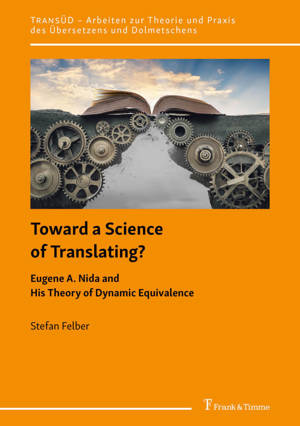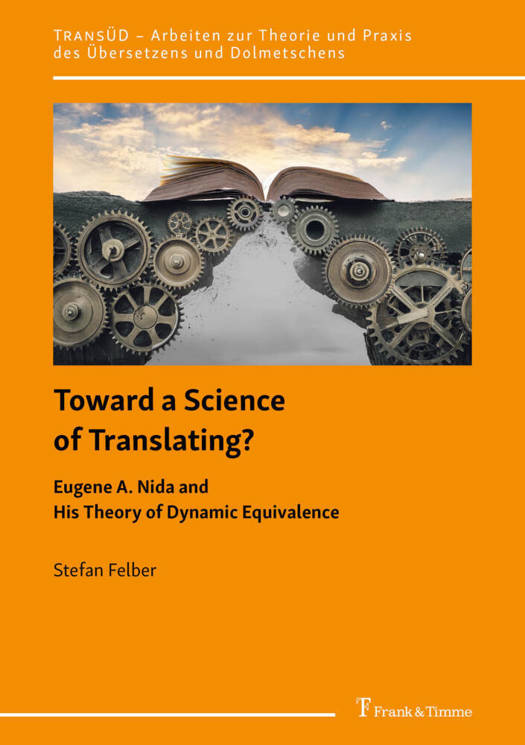
- Afhalen na 1 uur in een winkel met voorraad
- Gratis thuislevering in België vanaf € 30
- Ruim aanbod met 7 miljoen producten
- Afhalen na 1 uur in een winkel met voorraad
- Gratis thuislevering in België vanaf € 30
- Ruim aanbod met 7 miljoen producten
Zoeken
Toward a Science of Translating? Eugene A. Nida and His Theory of Dynamic Equivalence
Stefan Felber
Paperback | Engels | TransÜD. Arbeiten zur Theorie und Praxis des Übersetzens und Dolmetschens, | nr. 150
€ 67,45
+ 134 punten
Omschrijving
Eugene A. Nida is one of the pioneers and founders of modern translation theory, coining the terms dynamic equivalence and formal equivalence, and energetically promoting the former, though in his latter years preferring the term functional equivalence. Originally formulated for the Bible Translation efforts amongst people groups without the Bible, Nida's theories of translation have also been widely influential in Translation Studies, making this presentation of Eugene A. Nida's life (1914-2011) and assessment of his works especially timely and significant. Stefan Felber is a German Old Testament scholar, former seminary professor, and author of the (German only) Wesen und Würde des Wortes. Biblisch-theologische Grundlagen für das Verständnis von Sprache und Kommunikation (The Nature and Dignity of the Word. Biblical-Theological Foundations for Understanding Language and Communication), in: Zwischen Babel und Jerusalem - Aspekte von Sprache und Übersetzung, among other works. As such, he is uniquely qualified to offer this fair-minded and masterful, yet critical, evaluation of Nida's model of translation, doing so from a rich variety of disciplines, including exegesis, theology, philology, and philosophies of language. Whether one agrees or disagrees with either Nida or Felber, I highly recommend this rigorous and wide-ranging exposition for advancing informed dialogue and promoting further understanding and advances in Translation Studies.Professor Tom McCormick, Tyndale University & College, TorontoAlthough the theory of Dynamic (or Functional) Equivalence was the most widely used method in global Bible translation after the Second World War, there has been no comprehensive study of its foundations and how it was developed by Eugene Nida. Filling this gap is one of the great merits of Felber's study. Felber, while showing great respect for Nida, critically evaluates Dynamic Equivalence from various perspectives: exegetical, theological, philosophical, and linguistic. This multi-dimensional, nuanced approach provides the reader with thought-provoking and helpful insights that further the discussion in important ways. Felber's study is a must-read for all who deal with language and translation in theology and the church, in Bible translation, and mission!Prof. Dr. Markus Zehnder, Internationale Hochschule Bad Liebenzell / Evangelische theologische Fakulteit Leuven / Ansgarskolen KristiansandStefan Felber's Toward a Science of Translating? is a landmark study in Biblical Translation Theory, focussing on Eugene Nida (1914-2011), who for many years was a central figure in the American Bible Society and the United Bible Societies. Nida has been described as "probably the world's leading scholar on translation" and his theory of Dynamic or Functional Equivalence provided a leading paradigm for Bible translators for decades. In this thorough analysis of his work and its reception, Felber highlights a number of weaknesses as well as some strengths affiliated with Nida's theory - promoting translation theory based on reader-oriented thought-for-thought patterns rather than traditional source-oriented analysis of textual form and content. Felber's evaluation raises a critical question: Are facets of the biblical text pertaining to biblical language and hermeneutics, theology, and the transcendent downplayed in Nida's addressee-oriented approach to translation? I hope this book will be widely read by translators, biblical scholars and others interested in translation of the Bible. Dr. Tomas Bokedal, Associate Professor of New Testament and Early Christianity, NLA University College, Norway & Docent of New Testament Exegesis, Lund University, Sweden
Specificaties
Betrokkenen
- Auteur(s):
- Uitgeverij:
Inhoud
- Aantal bladzijden:
- 600
- Taal:
- Engels
- Reeks:
- Reeksnummer:
- nr. 150
Eigenschappen
- Productcode (EAN):
- 9783732911219
- Uitvoering:
- Paperback
- Afmetingen:
- 148 mm x 35 mm
- Gewicht:
- 858 g

Alleen bij Standaard Boekhandel
+ 134 punten op je klantenkaart van Standaard Boekhandel
Beoordelingen
We publiceren alleen reviews die voldoen aan de voorwaarden voor reviews. Bekijk onze voorwaarden voor reviews.











